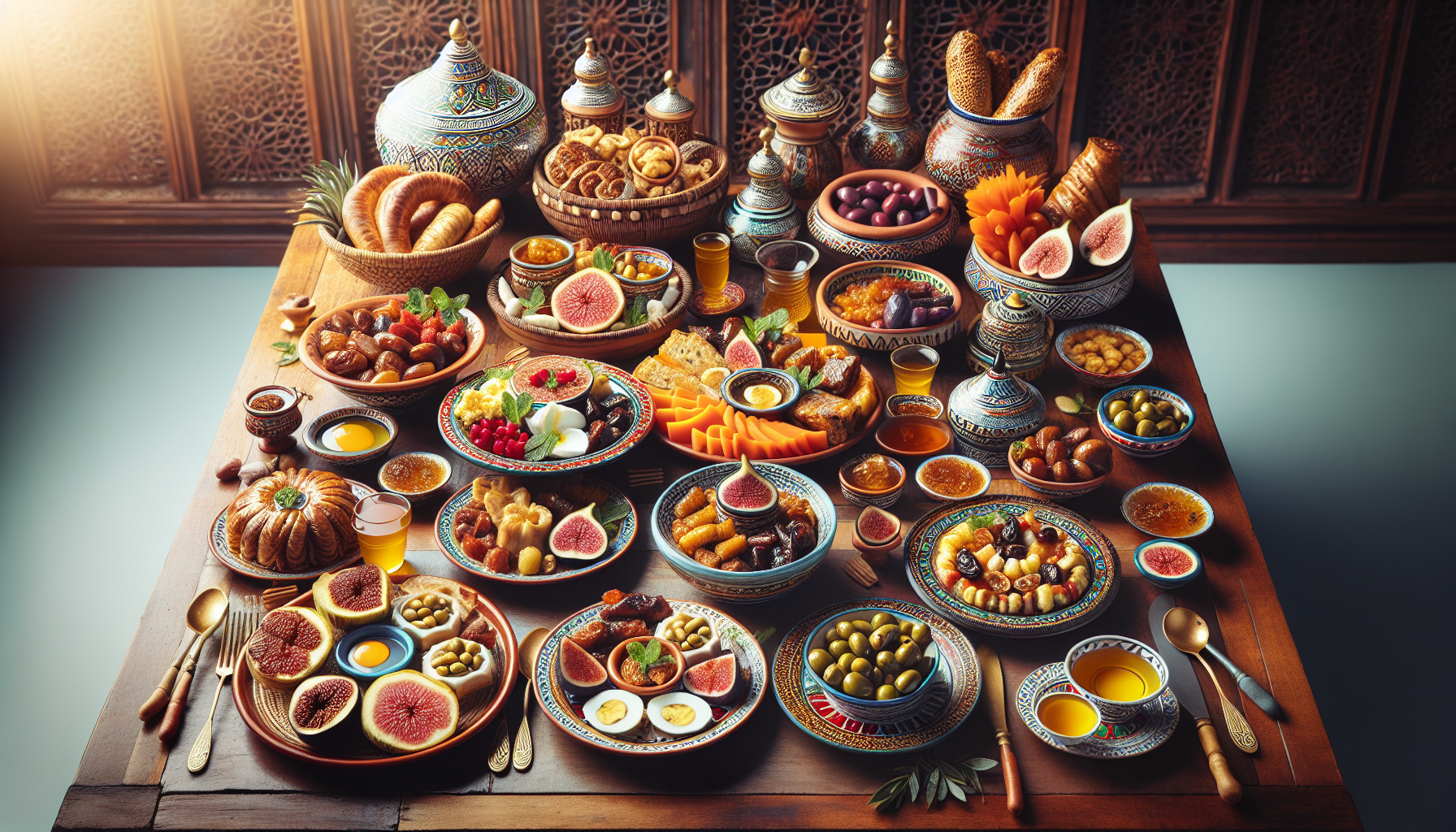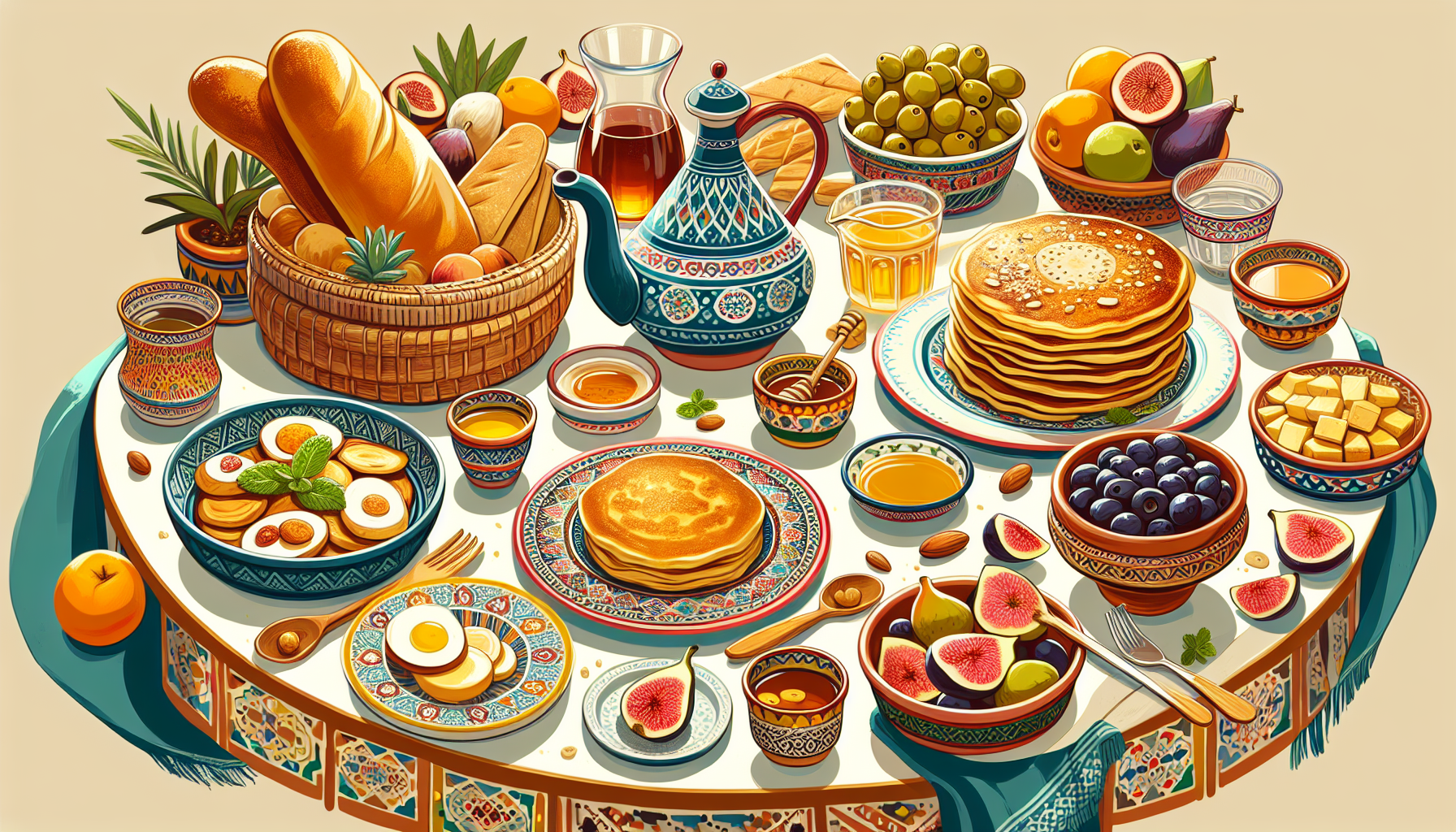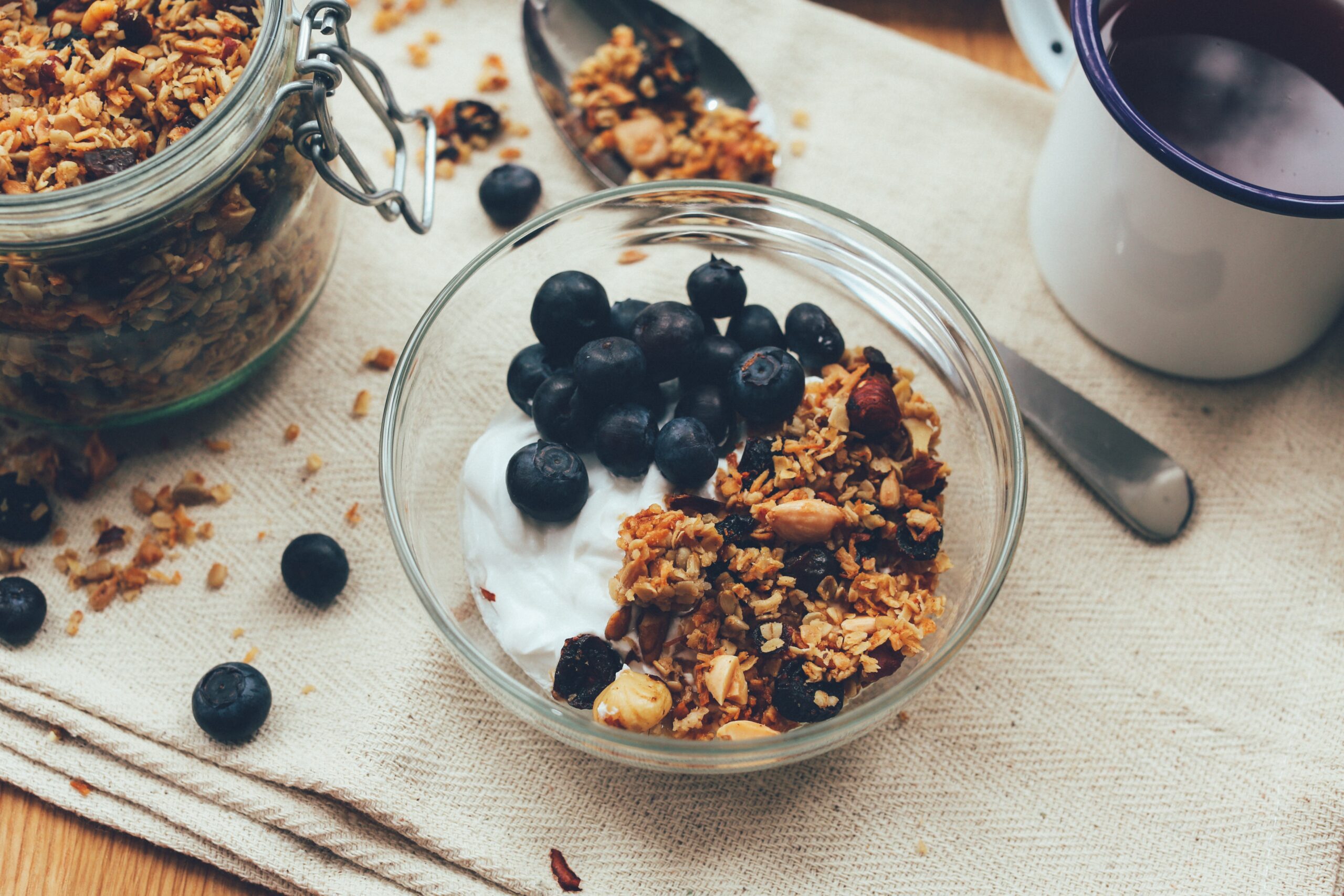Today we’re exploring the flavors of Morocco as we dive into the delightful world of Moroccan breakfast recipes. From aromatic spices to tantalizing flavors, Moroccan breakfasts are known for their unique and delicious combinations. Imagine starting your day with a warm, fluffy baghrir drizzled with honey or a traditional msemen filled with savory ingredients. Whether you’re a fan of sweet or savory breakfasts, there’s a mouth-watering Moroccan recipe waiting to tickle your taste buds. So, come along and discover your new favorite breakfast dish that will transport you straight to the bustling streets of Morocco.
Traditional Moroccan Breakfast Dishes
When it comes to starting your day with a burst of flavor, traditional Moroccan breakfast dishes are hard to beat. Known for their vibrant colors, aromatic spices, and unique combinations of ingredients, these dishes offer a delightful and satisfying way to kickstart your morning. From fluffy pancakes to hearty soups and refreshing beverages, Moroccan breakfast dishes are sure to impress your tastebuds. Here are some of the most popular traditional Moroccan breakfast recipes that you can try at home.
1. Moroccan Pancakes (Baghrir)
Ingredients
- 1 cup semolina flour
- 1/2 cup all-purpose flour
- 1 teaspoon active dry yeast
- 1 teaspoon sugar
- 1/2 teaspoon salt
- 1 1/2 cups warm water
Instructions
- In a large bowl, mix together the semolina flour, all-purpose flour, yeast, sugar, and salt.
- Gradually pour in warm water while continuously stirring the mixture, until a thick and smooth batter is formed.
- Cover the bowl and let the batter rest for about 30 minutes to allow the yeast to activate and the batter to slightly rise.
- Heat a non-stick skillet or griddle over medium heat. Pour a ladleful of batter onto the skillet and spread it into a thin and round pancake.
- Cook the pancake for about 2 minutes, until small air bubbles start to form on the surface. Flip the pancake and cook for another minute on the other side.
- Repeat the process with the remaining batter until all the pancakes are cooked.
- Serve the baghrir pancakes warm with your choice of toppings such as honey, butter, or jam.
Tips and Variations
- For a vegan version, you can replace the regular all-purpose flour with gluten-free flour.
- Top the baghrir pancakes with a sprinkle of powdered sugar and a drizzle of orange blossom water for an extra touch of sweetness.

2. Moroccan Semolina Pancakes (Msemen)
Ingredients
- 2 cups semolina flour
- 1 cup all-purpose flour
- 1 teaspoon salt
- 1 1/2 cups warm water
- 1/4 cup vegetable oil, plus more for frying
- 1/4 cup melted butter
Instructions
- In a large bowl, combine the semolina flour, all-purpose flour, and salt. Gradually add the warm water and mix well until a smooth dough is formed.
- Drizzle the vegetable oil over the dough and knead it for about 10 minutes until it becomes elastic and pliable.
- Divide the dough into small portions and shape each portion into a ball.
- On a lightly oiled surface, flatten each ball of dough into a thin round pancake. Brush the surface with melted butter.
- Fold the pancake into a square by folding the sides towards the center, then fold the corners to the center.
- Heat a non-stick skillet or griddle over medium heat. Cook each pancake for about 2 minutes on each side, until golden brown.
- Serve the msemen pancakes warm with a drizzle of honey or a side of traditional Moroccan butter and honey mixture.
Tips and Variations
- For a savory variation, you can stuff the msemen pancakes with a filling of your choice, such as cheese, vegetables, or minced meat, before folding them into squares.
- Experiment with different toppings and condiments, such as spicy harissa sauce or tangy chermoula sauce, to add an extra kick of flavor to your msemen pancakes.
3. Moroccan Sweet Bread (Harcha)
Ingredients
- 2 cups semolina flour
- 1/2 cup fine semolina flour
- 1/4 cup sugar
- 1 teaspoon baking powder
- 1/2 teaspoon salt
- 1/2 cup melted butter
- 1/2 cup warm milk
Instructions
- In a large bowl, combine the semolina flour, fine semolina flour, sugar, baking powder, and salt.
- Pour the melted butter over the dry ingredients and mix well until the mixture resembles coarse crumbs.
- Gradually add the warm milk and knead the dough until it comes together and is smooth and slightly sticky.
- Divide the dough into small portions and shape each portion into a round bread.
- Heat a non-stick skillet or griddle over medium heat. Cook the bread for about 5 minutes on each side, until golden brown and cooked through.
- Serve the harcha sweet bread warm with a spread of honey or jam.
Tips and Variations
- Add a tablespoon of orange blossom water or rose water to the dough for a fragrant twist.
- For a savory version, you can sprinkle grated cheese or chopped olives on top of the dough before cooking.

4. Moroccan Baked Eggs with Tomato Sauce (Shakshuka)
Ingredients
- 2 tablespoons olive oil
- 1 onion, thinly sliced
- 2 garlic cloves, minced
- 1 red bell pepper, thinly sliced
- 1 yellow bell pepper, thinly sliced
- 1 can (14 ounces) diced tomatoes, with juice
- 1 teaspoon cumin
- 1 teaspoon paprika
- 1/2 teaspoon salt
- 1/4 teaspoon black pepper
- 4-6 eggs
- Chopped fresh parsley, for garnish
Instructions
- Heat the olive oil in a large skillet over medium heat. Add the onion and garlic, and sauté for about 5 minutes until they are soft and translucent.
- Add the sliced bell peppers and continue to cook for another 5 minutes until they are slightly tender.
- Stir in the diced tomatoes, cumin, paprika, salt, and black pepper. Simmer the sauce for about 10 minutes until it thickens slightly.
- Create little wells in the sauce and crack the eggs into them. Cover the skillet and cook for about 5-7 minutes until the eggs are cooked to your desired doneness.
- Garnish with chopped fresh parsley and serve the shakshuka hot with crusty bread or Moroccan flatbread.
Tips and Variations
- Add a pinch of chili flakes or a sprinkle of cayenne pepper to the sauce for a spicier version of shakshuka.
- For a heartier meal, you can add cooked chickpeas or crumbled feta cheese to the sauce before adding the eggs.
5. Moroccan Flatbread with Olives and Cheese (Khobz bi Zeitun)
Ingredients
- 3 cups all-purpose flour
- 1 teaspoon salt
- 1 tablespoon sugar
- 2 teaspoons active dry yeast
- 3/4 cup warm water
- 1/2 cup pitted olives, chopped
- 1/2 cup crumbled feta cheese
- 1/4 cup chopped fresh parsley
Instructions
- In a large bowl, whisk together the all-purpose flour, salt, and sugar.
- Dissolve the yeast in warm water and let it sit for about 5 minutes until it becomes frothy.
- Pour the yeast mixture into the flour mixture and mix well until a smooth dough is formed.
- Turn the dough out onto a floured surface and knead it for about 5 minutes until it is elastic and no longer sticky.
- Divide the dough into small portions and shape each portion into a flat round bread.
- Press the chopped olives, crumbled feta cheese, and chopped fresh parsley onto the surface of each bread.
- Place the bread on a baking sheet and bake in a preheated oven at 400°F (200°C) for about 15-20 minutes or until golden brown.
- Serve the khobz bi zeitun flatbread warm with butter or your favorite Moroccan dip.
Tips and Variations
- Experiment with different fillings such as sun-dried tomatoes, caramelized onions, or za’atar spice mix for unique flavors.
- Brush the bread with olive oil and sprinkle sesame seeds or nigella seeds before baking for added texture and taste.

6. Moroccan Bean Soup (Bessara)
Ingredients
- 1 cup dried fava beans or dried split peas
- 4 cups vegetable broth
- 1 onion, chopped
- 2 garlic cloves, minced
- 1 teaspoon cumin
- 1/2 teaspoon paprika
- 1/4 teaspoon cayenne pepper (optional)
- Salt and pepper, to taste
- Olive oil, for drizzling
- Chopped fresh cilantro, for garnish
Instructions
- Rinse the dried fava beans or split peas under cold water.
- In a large pot, combine the beans or split peas and vegetable broth. Bring to a boil and then reduce the heat to low and simmer for about 45 minutes to 1 hour, until the beans or split peas are soft and cooked through.
- In a separate skillet, heat a drizzle of olive oil over medium heat. Add the chopped onion and minced garlic, and sauté until they are soft and golden.
- Add the onion and garlic mixture to the cooked beans or split peas. Stir in the cumin, paprika, cayenne pepper (if using), salt, and pepper. Cook for an additional 10 minutes to allow the flavors to meld together.
- Using an immersion blender or a regular blender, blend the soup until smooth and creamy. If needed, add more vegetable broth or water to achieve the desired consistency.
- Return the soup to the pot and heat over low heat until warmed through.
- Serve the bessara soup hot, garnished with chopped fresh cilantro and a drizzle of olive oil.
Tips and Variations
- For extra creaminess, you can add a splash of coconut milk or heavy cream to the soup.
- Top the soup with a dollop of Greek yogurt or crème fraîche for an added tangy flavor.
7. Moroccan Lentil Soup (Harira)
Ingredients
- 1 cup dried lentils
- 1 onion, chopped
- 2 garlic cloves, minced
- 1 carrot, diced
- 1 celery stalk, diced
- 1 can (14 ounces) diced tomatoes, with juice
- 4 cups vegetable broth
- 1/2 teaspoon ground turmeric
- 1/2 teaspoon ground ginger
- 1/2 teaspoon ground cinnamon
- 1/2 teaspoon ground cumin
- Salt and pepper, to taste
- Lemon wedges, for serving
- Chopped fresh cilantro, for garnish
Instructions
- Rinse the dried lentils under cold water.
- In a large pot, combine the lentils, chopped onion, minced garlic, diced carrot, diced celery, diced tomatoes, vegetable broth, turmeric, ginger, cinnamon, cumin, salt, and pepper.
- Bring the mixture to a boil and then reduce the heat to low. Cover the pot and simmer for about 30-40 minutes, until the lentils are tender.
- Using an immersion blender or a regular blender, blend a portion of the soup until smooth. This helps to thicken the soup while still leaving some texture from the whole lentils.
- Return the blended soup to the pot and stir well to combine.
- Heat the soup over low heat until warmed through.
- Serve the harira lentil soup hot, garnished with a squeeze of lemon juice and a sprinkle of chopped fresh cilantro.
Tips and Variations
- Add a can of chickpeas or cooked chicken for added protein and texture.
- Serve the soup with a side of traditional Moroccan bread or a crusty baguette for a complete and comforting meal.

8. Moroccan Mint Tea
Ingredients
- 4-5 sprigs fresh mint leaves
- 3 teaspoons gunpowder green tea leaves
- 4 cups boiling water
- Sugar, to taste
Instructions
- Rinse the mint leaves and place them in a teapot.
- Add the gunpowder green tea leaves to the teapot.
- Pour the boiling water over the mint leaves and tea leaves.
- Let the mixture steep for about 2-3 minutes, or until the desired strength is reached.
- Strain the tea and discard the mint leaves and tea leaves.
- Sweeten the tea with sugar to taste.
- Serve the Moroccan mint tea hot and enjoy its refreshing flavors.
Tips and Variations
- Moroccan mint tea is typically served in small glasses and enjoyed with a side of traditional Moroccan pastries or cookies, such as almond ghriba or honey-soaked baklava.
- You can add a splash of orange blossom water or rose water to the tea for extra fragrance and aroma.
9. Moroccan Orange Juice
Nothing beats the refreshing taste of freshly squeezed orange juice to accompany your Moroccan breakfast. The vibrant citrus flavors of Moroccan oranges provide a burst of energy and vitality to start your day on a bright and zesty note. Simply squeeze the juice from a few ripe oranges and serve it chilled in a tall glass. Feel free to add a squeeze of lemon juice or a sprinkle of sugar for a tangier or sweeter taste, respectively. This simple yet invigorating beverage is a staple in Moroccan breakfast culture.

10. Moroccan Almond Milk (Shlada)
Ingredients
- 1 cup raw almonds
- 4 cups cold water
- 2 tablespoons honey, or to taste
- 1/2 teaspoon almond extract
Instructions
- Soak the raw almonds in cold water overnight or for at least 8 hours. This helps to soften the almonds and release their natural flavors.
- Drain the soaked almonds and discard the soaking water.
- In a blender, combine the soaked almonds, cold water, honey, and almond extract.
- Blend the mixture on high speed for about 1-2 minutes until the almonds are finely ground and the mixture is creamy.
- Strain the almond milk through a fine-mesh strainer or cheesecloth to remove any almond pulp.
- Transfer the strained almond milk to a bottle or jar and refrigerate it until chilled.
- Serve the Moroccan almond milk cold and enjoy its smooth and nutty taste.
Tips and Variations
- For a touch of fragrant sweetness, you can add a pinch of ground cinnamon or a few drops of orange blossom water to the almond milk.
- Use the leftover almond pulp as a nutritious addition to baked goods, smoothies, or breakfast cereals.
With these traditional Moroccan breakfast dishes, you can bring the vibrant flavors of Morocco into your own kitchen. Whether you prefer the light and fluffy pancakes, the hearty and comforting soups, or the refreshing beverages, there is something for everyone to enjoy. So spice up your mornings and start your day with a flavorful and satisfying Moroccan breakfast experience. Your taste buds will thank you!
